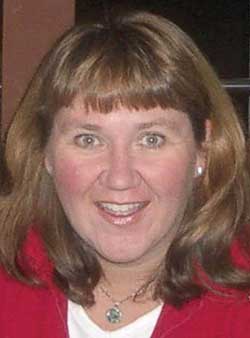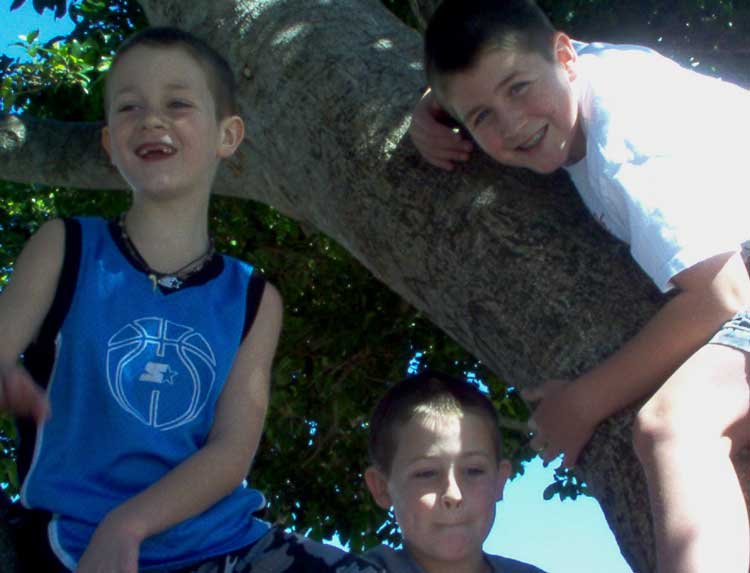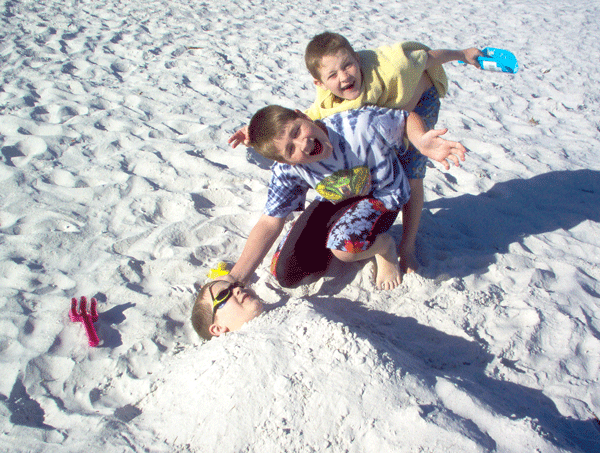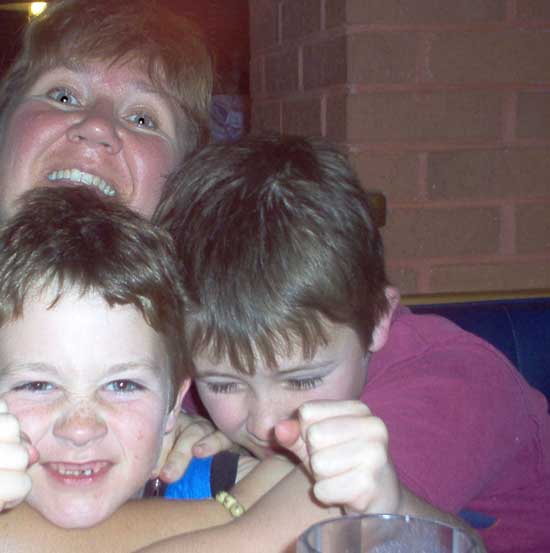
If you would like to hear Sandy's voice before you read, click here to go to a short TV spot below.
There will be a link to get back here.

If you would like to hear Sandy's voice before you read, click here to go to a short TV spot below.
There will be a link to get back here.
Hello—welcome, and thanks for coming. I have been asked to speak to you for an hour today, but you know, as unschoolers we ask our kids “What does your heart need?” and so I have to say that what my heart needs is to NOT talk for an hour! I’ll do you all a favour and honour that need this afternoon.
But I am looking forward to talking to you—in particular, about the movement from schooling to unschooling. For my family, this has been a gradual and ongoing shift; two of our children came home to learn two years ago, and our youngest just left school last month. We are still, in many ways, deschooling; that is, unlearning our schooly ways and opening ourselves to unschooling. And I think for most of us here today, deschooling is something that’s an ongoing process.
When we first dipped our toes tentatively into the unschooling waters, I was absolutely terrified. It was only months after hearing the word “unschooling” for the very first time that I attended the Live and Learn Conference in Peabody (or Peebddy…) I wandered around that entire conference weekend wide-eyed and panic-stricken (I’m sure I probably frightened several small children, in fact). We had taken two of our children out of school, but we didn’t know what was next. And even though with each new thing I learned about unschooling I became more and more certain it was what they needed, that place between schooling and unschooling was really scary. I’m not sure if many of you are in that place—that transition zone—but if you are, and if you’re afraid – uh, first of all, try not to scare any of the kids here this weekend…and also, sit tight, you’re not alone. It doesn’t have to be terrifying; you just need to see the transition in a different light.
I’d like to share a story with you now – it was written by Danaan Parry, and it’s called "Fear of Transformation":
Sometimes I feel that my life is a series of trapeze swings. I'm either hanging on to a trapeze bar swinging along or, for a few moments in my life, I'm hurtling across space in between trapeze bars. I spend most of the time hanging on for dear life to my trapeze-bar-of-the-moment. It carries me along at a certain steady rate of swing and I have the feeling that I'm in control of my life. I know most of the right questions and even some of the right answers. But once in a while, as I'm merrily (or not so merrily) swinging along, I look ahead of me into the distance, and what do I see? I see another trapeze bar swinging toward me. It's empty, and I know, in that place that knows, that this new trapeze bar has my name on it. It is my next step, my growth; my aliveness coming to get me. In my heart-of-hearts I know that for me to grow, I must release my grip on the present, well-known bar to move to the new one.Each time it happens to me, I hope that I won't have to grab the new one. But in that knowing place I know I must totally release my grasp on the old bar, and for some moment in time hurtle across space before I can grab onto the new one. Each time, I am filled with terror. It doesn't matter that in all my previous hurtles across the void of unknowing, I have always made it. Each time I am afraid I will miss, that I will be crushed on the unseen rocks in the bottomless chasm between the bars. But I do it anyway. Perhaps this is the essence of what the mystics call the faith experience. No guarantees, no net, no insurance policy, but you do it anyway because somehow, to keep hanging onto that old bar is no longer on the list of alternatives. And so for an eternity that can last a microsecond or a thousand lifetimes, I soar across the dark void of "the past is gone, the future is not yet here." It's called transition. I have come to believe that this is the place where real change occurs.
I have noticed that, in our culture, this transition zone is looked upon as a "no-thing", a no-place between places. Sure the old trapeze-bar was real, and that new one coming towards me, I hope that's real too. But the void in between? That's just a scary, confusing, disorienting "nowhere" that must be gotten through as fast and unconsciously as possible. What a waste! I have a sneaking suspicion that the transition zone is the only real thing, and the bars are illusions we dream up, to avoid where the real change, the real growth occurs for us. Whether or not my hunch is true, it remains that the transition zones in our lives are incredibly rich places. They should be honored, even savored. Yes, with all the pain and fear and feelings of being out-of-control that can (but not necessarily) accompany transitions, they are still the most alive, most growth-filled, passionate, expansive moments in our lives.
And so, transformation of fear may have nothing to do with making fear go away, but rather with giving ourselves permission to "hang-out" in the transition between trapeze bars. Transforming our need to grab that new bar, any bar, is allowing ourselves to dwell in the place where change happens. It can be terrifying. It can also be enlightening, in the true sense of the word. Hurtling through the void, we just may learn how to fly.

This place between schooling and unschooling, this place that we often refer to as deschooling, it really is a wonderful (place) to grow and learn. It’s the place where change occurs, where we unburden ourselves. It’s where we look at old definitions with new eyes and say, perhaps for the first time, “That definition just doesn’t work for me and my family.” Parry calls this “scary, confusing, disorienting nowhere” a place where we can experience “the most alive, most growth-filled, passionate, expansive moments in our lives.”
For me, it was as I “hurtled through the void” between trapeze bars that I was privileged enough to watch my son, who is an artist, rediscover his passion. He had become seriously depressed at school and had completely stopped drawing, something he had previously done for hours at a time. As he grew more and more accustomed to the unfettered feeling of NOT being at school, NOT being told what should be important to him…as he began to heal, he started to draw again. His art had been gone from our lives for nearly a year, and I had no idea how badly I’d missed it, until it came back. So, in that place between schooling and unschooling, one of the many gifts I received was the return of my son’s imagination. We reconnected with the indescribable joy of sitting together on the couch, talking about his monsters and creatures and their extraordinary adventures. Within a week of picking up his pencil crayons again, my son had filled two large sketchbooks, and has filled many more since that time. (And this is just one example of the hundreds of expansive moments that dotted our deschooling landscape.) It’s hard for me to even say these words, but, What if? What if he’d stayed in school? What if his exquisite passion had never come back?
So, if you’re still deschooling (and, again, who isn’t?) enjoy the thrill of being in between trapeze bars. It’s true, that’s where most of your growth happens, when you’re not attached to either one or the other. If you are feeling afraid but you really want to let go of your schoolish notions, I’m sure there are many people in this room who can assure you that the next bar, the unschooling one, really is your aliveness coming to get you. So when you’re ready—when somehow, to keep hanging onto that old bar is no longer on the list of alternatives—let go. Let go and trust that when you do reach towards that unschooling trapeze, you and your children will feel more free and alive than you ever have before.
There are a couple of other analogies that seem to lend themselves well to conversations about moving from schooling to unschooling. The first is one Sandra Dodd alludes to in her article “Deschooling for Parents”—it’s similar to the idea of letting go; it illustrates the importance of emptying one’s metaphorical cup in order to drink, or receive. It is the story of a learned university professor who went to visit a famous Zen master. While the master quietly served tea, the professor talked in a very informed manner about Zen. The master poured the visitor's cup to the brim, and then kept pouring. The professor watched the overflowing cup until he could no longer restrain himself. "It's overfull! No more will go in!" the professor blurted. "You are like this cup," the master replied, "How can I show you Zen unless you first empty your cup."
As we deschool ourselves, we must empty our cups of all the preconceived ideas, concepts, expectations and methods that prevent us from embracing unschooling. This seems like a simple thing to do, but it can be quite difficult in practice. At first we think we have emptied our cups but as we drink, we often detect a residual, schooly taste. And sometimes, even a little residue can curdle the whole pot of tea. So, it’s important to have a "clean receptacle," as it were, in order to taste the true essence of unschooling life.
The other analogy is one used by Anne Ohman in her talk “The View from Unschooling.” Here, the movement from schooling to unschooling is compared to building a bridge, the idea being that we “cross over” from one to the other and that we need certain tools in order to do so. This was certainly an apt description of my family as we took our first nervous steps towards unschooling. After that conference in Massacusetts, I was determined to be the fearless leader—I saw the vast distance between traditional education and what my children needed and I got busy. If my boys needed a bridge, then gosh darn it, I’d build the strongest one in the world! Head down, eyes on the prize, I started building. I knew I needed tools, so I set about getting them.
So, I was very focused on the task at hand when my children left school. Getting tools, making plans, taking measurements… Like I said, I had my head down and my eyes on the prize. I was determined to help us cross over to unschooling in the best, most efficient way I could find. The problem was, with my head down, busy with my work, I didn’t see my kids much. Fortunately, though, I heard them and, if you’ll allow me to extend this metaphor for just a bit, imagine my surprise when, as I looked up, I realized that their happy shouts and laughter came from high overhead—while I was busy building a bridge, they were already flying over to unschooling!
I couldn’t figure out how they did it—there’s still so much about my children and what they do that’s a mystery to me—but there they were, unafraid, unencumbered by tools or plans or measurements, finding their own way across, completely without my help. As you can imagine, I had to lighten my load considerably before I could even try to join them. I had to unburden myself, by getting rid of a lot of the junk from my toolbox (I’ll let you decide which “tools” were the first to go!) And, because I wasn’t unschooled, and because I’m a mere adult, I have to take the long route to unschooling. I need my bridge. But, with my children’s help, I’m becoming a much more efficient builder—and I know, now, that their joy—our joy—is the real “prize.”

So, I think that what all of these analogies demonstrate is the importance, as we move toward unschooling, of letting go. Letting go of what we think we know, letting go of what we think we need, what we think our children need. Mainstream society has done a really good job of telling us what we need in order to be happy, successful, fulfilled. And you would think that since most of us in this room are clearly such smart and insightful people, we as parents would understand that it’s all a pile of…baloney…but in reality, it is really difficult to let go of these notions. It’s hard to empty your cup. It’s hard to let go of tools and measuring tapes we’ve carried around forever. And when you’re swinging comfortably on one bar, it can be very frightening…to “let go.”
It is, however, so very liberating to do so. At least it has been for us. So, now I thought I might share with you some of the things my husband and I have managed to let go of, on our journey from schooling to unschooling:
We've let go of the notion that busy means programmed, and that active means competitive. All three of our children are what I would consider busy and active, but only one is involved in programmed, competitive sport. (We work hard to remind him that the grown-up notion of dividing the world into winners and losers is not, perhaps, the best way to proceed…) Some of the spontaneous, busy activities our children participate in are: bouncing, walking, biking, hiking, running, sliding, swimming, kayaking, tree-climbing, couch-climbing, Mummy-climbing…wrestling, running away from each other, running towards each other, running into each other. Even watching a movie is usually “active” in our house…one son jumps up and down during the exciting parts, one runs upstairs when the music becomes overly dramatic or suspenseful, and one is just in constant motion, climbing all over the couch and his father, bouncing on his mini-trampoline, and running from one of us to the next, asking questions and commenting on various aspects of the movie.
We've let go of the idea that “reading” means just books! We read: signs on the street, words on the TV screen/movie screen/computer screen, on the game board, on posters, in comics and magazines and newspapers and invitations and instruction manuals and so on.
We've let go of the notion that there is anything remotely humane or respectful about the schoolish requirement that a child empty his or her bladder according to someone else’s needs rather than according to his or her own needs.
We've let go of the belief that one needs to know how to do long division in order to thrive in the real world.
We've let go of telling our children what to eat and when to eat, and how much sleep they need. We see quite clearly that this strategy did not work so well for those of us who were raised with it – we wish we were better at knowing, intrinsically knowing, what our bodies need.
We have let go of the idea that quiet equals good. In schools, quiet classrooms are considered great classrooms. I used to be a teacher. I was considered an “excellent” teacher, because my classroom was often quiet. People tend to believe that learning always happens in quiet places. Think of traditional libraries! Well, I was not an excellent teacher. I was not even a good teacher. I was a controlling teacher. And there is a big difference between great learning and controlled learning.
So…these are just a few examples of the things we’ve let go of, as we try to leave our schoolish mindset behind.
In our movement towards unschooling, we have of course also had to embrace new concepts and beliefs. We have seen our aliveness coming to get us, and these are some of the things that characterize the new, unschooling trapeze bar we’re reaching for.
We’ve learned that:
Talking to artists is much more fun than reading about them.
We’ve learned that:
Skill-testing questions provide wonderful incentive to learn Order of Operations.
We’ve learned that:
Parents can be very rude while teaching their children manners.
We’ve learned that:
A lot of people spend a lot of time developing a lot of curriculum, for which there is very little…practical…use in the real world.
We’ve learned that:
The absolute best way to have fun with fractions is by baking!
I’ve never met a child who doesn’t love to bake.
And if your child doesn’t like to bake, there’s not enough chocolate in your recipes.
Similarly, the best way to learn about geography is by traveling, the best way to learn about nature is to muck about in the woods, and so on.
(It’s all about relevant, meaningful, hands-on learning. Which, by the way, explains why my own children have such a poor grasp on money-related topics.)
We’ve also learned that discussing a federal election with your 11 year-old can make him more informed, politically, than his grandparents.
It should be noted that grandparents may not necessarily appreciate this reality.
Finally, we have learned that for our family, living a life guided by one solid principle feels better than living a life governed by many rules. This has helped us immensely as we figure out what unschooling looks like for us. I remember that at the conference in Massachusetts, Barbara Sher said that she had only two rules for her children: Don’t kill each other, and Don’t wreck my stuff. But the principle we agreed upon as a family is, “Always show respect.” Our children understand that this respect starts with the Self (body, mind and spirit) and flows outward to Other people and things, and the Universe. This has been one of the many wonderful concepts we have embraced, as we embrace an unschooling life. It applies beautifully to just about every situation we encounter as a family, and our children are internalizing its importance, rather than merely obeying us.

I joked earlier on about what my heart needs (which is, at this point, to stop talking soon), but in all seriousness – imagine for a moment a world full of people who really, truly know what their hearts need. Imagine all people living their lives passionately and feeling fulfilled at the end of every day. Imagine people who, like our children, know without question that what is in their hearts is valid and important and worthy of attention. Don’t you think there would be a whole lot less addiction, and divorce, and depression and misery in the world? Don’t you think there might be more peace in the world?
The movement from schooling to unschooling has definitely brought me, and my family closer to what our hearts need. It’s still a journey; we’re still deschooling and likely always will be. But we have let go of so many definitions that limit us, methods that don’t work for us and expectations that just don’t fit. We have tried to empty our cups in order to make room for joy and meaningful living. Finally, let me say that it is still sometimes very frightening for us to be hurtling across the void of unknowing. We all have our moments! But I guess we’re just trying to enjoy the ride. Because it’s entirely possible that, as Parry suggests, this transition zone is the only real thing, and that the trapeze bars are just illusions we dream up to make ourselves feel we have something to hang on to. What a trip, though, wherever you are in your journey, to feel that aliveness coming to get you! Thank you so much for your attention…
"We too are hanging between the 2 trapeze bars. We started homeschooling 5 years ago and are gradually working our way, away from schooly things...I love reading about how others have made the 'leap of faith.' Thanks for your inspiration." —Beth
Sandy Lubert, on TVO in Ontario, September 2013; seven years after the presentation above.
The links below used to be public-access, but now are only for subscribers of that magazine. Sorry.
Articles by Sandy Lubert can be found here:
Life, Learning and Laughter—Celebrating our children's choices unconditionally. (Life Learning Magazine, May/June 2006)Mouths of Babes—When topics are addressed as children are ready and/or interested, rather than when a curriculum dictates, the kids ask questions and challenge the answers...often humorously. (Life Learning Magazine, March/April 2006)
Still Learning After All Those Years—Learning knows no age barriers and can keep the elderly young at heart. (Life Learning, January/February 2006)
Life, Learning & Laughter—A humorous look at finding our own way in education, nutrition, family roles and sex-role stereotyping.(Life Learning, November/December 2005)
Deschooling for Parents, the article Sandy mentioned above, with the overflowing cup story. It's not my original story, but it's a good analogy!